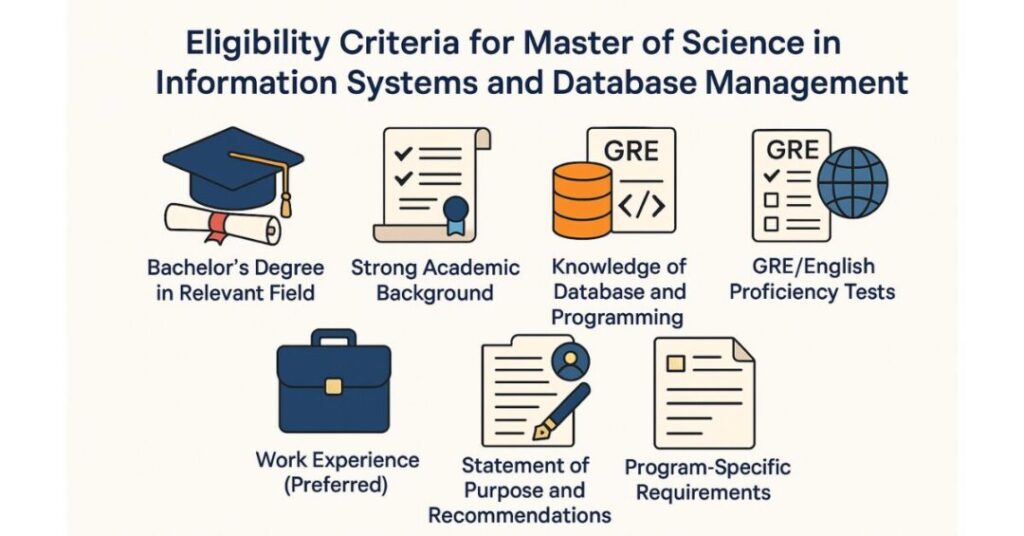24 September 2025
6 minutes read
MS in Database in USA: A Complete Guide for Indian Students

Key Takeaways
- MS in Database in USA offers strong career prospects with 8% job growth projected for database administrators and architects.
- Top universities provide advanced coursework in data analytics, machine learning, and database security, though costs can be high.
- Indian students should plan smartly by meeting eligibility, applying for scholarships, and building a strong application profile.
Did you know the Bureau of Labor Statistics predicts over 8% job growth for database administrators and architects by 2032? For many Indian students, this sounds promising, but the reality is tough; rising tuition fees, complex admission requirements, and uncertainty about the right degree program often create roadblocks.
That’s where pursuing an MS in Database in USA becomes a game-changer. With structured coursework, specializations in data analytics and database management, and access to scholarships, it prepares graduates for global careers in information systems.
Why Choose the USA for MS in Database?
Pursuing an MS in Database in USA offers unmatched opportunities for Indian students to excel in database management, information systems, and data science. US universities provide cutting-edge graduate programs with specialization in areas like data mining, data analytics, business intelligence, and database security.
With accredit institutions, advanced coursework, and strong ties to industry, students gain hands-on experience in database systems and information technology. According to the Bureau of Labor Statistics, job growth for database administrators and architects ensures rewarding career prospects after graduation.
10 Top Universities for MS in Database in USA for Indian Students
Choosing the right university for your MS in Database in USA is one of the most important decisions for Indian students. The US offers world-class computer science programs with strong focus on database design, big data, machine learning, data warehousing, and information security, preparing graduates for careers in database administration and management.
Below is a list of top universities with tuition fees to help you make an informed choice.
| University | Key Highlights | Tuition Fees (per year) |
|---|---|---|
| Stanford University | Strong computer science courses, focus on database technology, data modeling, and advanced database research | $62,484 |
| Carnegie Mellon University | Renowned for data science, machine learning, and programs in database management with information systems concentration | $61,344 |
| University of California, Berkeley | Expertise in big data, data analysis, data security, and database management systems | $48,465 |
| Massachusetts Institute of Technology (MIT) | Cutting-edge database administration and management, computer systems, and large-scale data projects | $57,590 |
| University of Illinois Urbana-Champaign | Known for computer programming, data warehousing, and business intelligence concentration | $36,018 |
| New York University (NYU) | Offers science in computer information systems, focus on database design and technology management | $53,308 |
| University of Southern California (USC) | Specialization in database management systems, security management, and information assurance | $63,468 |
| Purdue University | Strong degree in database management, emphasis on project management and analyze data coursework | $29,132 |
| University of Texas at Austin | Accredited graduate programs in science in information technology with specialization in database | $37,092 |
| Columbia University | Focus on master of science in computer with database administration, computer networks, and complex data projects | $65,524 |
Eligibility Criteria for Master of Science in Information Systems and Database Management
Pursuing an MS in Database in USA requires meeting specific eligibility benchmarks that prepare students for advanced data management and information systems study.

Universities in the U.S. set clear program requirements to ensure graduates are ready for careers as data analysts, data scientists, and database managers in today’s digital economy.
- Bachelor’s Degree in a Relevant Field
Applicants must complete a bachelor’s degree in computer science, information technology with a specialization, or a related area. This ensures foundational knowledge of fundamentals of data, database systems, and computer information systems concentration. - Strong Academic Background
Students should have studied topics like data modeling, database management systems, and computer systems. Most universities accredited by the Northwest Commission on Colleges and Universities or Commission on Colleges and Universities prefer candidates with exposure to management concepts and technical skills. - Knowledge of Database and Programming
Applicants must demonstrate knowledge of database, performing data analysis, and proficiency in computer programming. Skills in SQL, Python, or Java help in handling complex data sets and aligning with information systems concentration in database management. - GRE/English Proficiency Tests
While some universities allow waivers, many graduate programs require GRE scores and proof of English proficiency (TOEFL/IELTS). These may not be taken lightly, as they reflect readiness for higher learning in rigorous master’s in database management coursework. - Work Experience (Preferred, Not Mandatory)
Some universities, especially those offering online learning or science in data science programs, value applicants with industry experience in data security, project management, or technology management. An academic advisor can guide on whether prior roles in data management strengthen your application. - Statement of Purpose and Recommendations
Applicants must submit an SOP detailing their interest in database administration and management, information security, and how they plan to focus on the application of advanced database skills. Letters of recommendation validate your potential for graduate-level research. - Program-Specific Requirements
Each degree in database management has unique program requirements, such as prerequisites in computer networks or data analysis. Some modules may not be taken without prior credits, and universities often provide detailed guidance through their center of academic excellence.
Application Process for MS in Database Administration in USA
Applying for an MS in Database in USA can feel overwhelming, but knowing the step-by-step process makes it manageable. From preparing documents to meeting user requirements, each stage is crucial to secure admission in top universities.
- Research Universities and Programs
Begin by shortlisting universities offering master of science in data or database administration programs. Review curricula, faculty, and program highlights including information on experience with the latest technologies. - Check Eligibility and Requirements
Understand the user requirements, GPA, and test score criteria. Universities often outline prerequisites like coursework in computer science and prior knowledge of databases. - Prepare Application Documents
Applicants must prepare Statement of Purpose (SOPs), LORs, transcripts, and resumes. Be mindful of the university’s privacy policy when uploading sensitive academic records. - Submit Online Application
Complete the online form, attach documents, and pay the fee. Universities provide portals to track application progress and compliance with the department of homeland security requirements for international students. - Answer Program-Specific Questions
Some applications include short essays or technical assessments. These evaluate your motivation, knowledge of data, and readiness to meet academic and user requirements. - Await Admission Decision
Once submitted, the waiting period varies. Students often ask, “long does it take?” The answer is usually 6–12 weeks, depending on the university’s review cycle. - Secure Funding and Scholarships
Explore assistantships, grants, and scholarships to support tuition. Universities often guide applicants including information on financial aid opportunities. - Apply for Student Visa
After admission, apply for the F-1 visa. Compliance with the department of homeland security guidelines is necessary to ensure smooth entry to the U.S.
Cost of Studying MS in Database Degree Program in USA
Understanding the cost of pursuing an MS in Database in USA is essential for Indian students planning their higher education. Expenses typically include tuition fees, living costs, health insurance, and other academic charges that vary by university and location.
| Expense Category | Average Annual Cost (in USD) | Description |
|---|---|---|
| Tuition Fees | $30,000 – $65,000 | Varies by university, program reputation, and specialization in databases, data science, or information systems. |
| Living Expenses | $12,000 – $20,000 | Includes housing, food, transportation, and personal expenses depending on city and lifestyle. |
| Health Insurance | $1,500 – $2,500 | Mandatory for all international students, covering medical care in the U.S. |
| Books & Supplies | $800 – $1,500 | Covers textbooks, software, and academic resources needed for coursework. |
| Miscellaneous Costs | $1,000 – $2,000 | Includes student activity fees, recreation, and other incidental costs. |
Scholarships and Financial Aid for Indian Students
Indian students often grapple with high tuition, living costs, and limited funding when pursuing graduate studies abroad.

Scholarships and financial aid can dramatically lighten this burden, but you must know where to look and how to qualify.
| Scholarship / Aid | What It Covers | Key Notes / Eligibility |
|---|---|---|
| Fulbright-Nehru Master’s Fellowship | Full or partial tuition, living stipend, travel | For Indian graduates pursuing master’s in U.S., strong academic record & leadership required |
| Inlaks Shivdasani Foundation Scholarships | Tuition + living expenses | Applicants must have admission offer in U.S. master’s / PhD programs; merit-based selection |
| Narotam Sekhsaria Foundation Scholarship | Loan-cum-scholarship (partial or full) | For Indian students doing master’s abroad, competitive selection |
| University / Departmental Scholarships | Varies (tuition waiver, stipends) | Many U.S. graduate programs in data management, information systems, database design, etc., offer internal aid |
| Private & Foundation Grants | Partial funding | Organizations such as SEED Foundation, Upakar, etc., offer grants for Indian students in the U.S. |
Career Opportunities After Master’s Degree in Database Management in USA
Graduates of an MS in Database in USA find diverse career paths in technology and business sectors. Roles include database administrators managing secure systems, data analysts and data scientists working with big data and machine learning, and business intelligence analysts specializing in data warehousing and analytics.
Others become database architects focusing on database design, or information security analysts ensuring compliance and protection. With expertise in data management and project management, graduates are well-prepared for high-demand, well-paying roles across industries.
Conclusion
Pursuing an MS in Database in USA can open doors to global opportunities, cutting-edge research, and rewarding careers in data management, database administration, and information systems. But success begins with building the right profile and crafting a strong application strategy.
That’s where Ambitio makes a difference. From personalized mentorship to end-to-end profile building, we help you stand out in a competitive applicant pool.
Ready to take the next step toward your dream university? Don’t wait, contact us at Ambitio today and let’s shape your future together with confidence and clarity.
FAQs
What is the difference between data mining and data warehousing?
Data mining involves analyzing large sets of data to discover patterns and relationships, whereas data warehousing is the process of collecting and managing data from various sources in a centralized repository.
Can I pursue an MS in Database without a background in Computer Science?
Yes, many programs offer foundational courses for students without a Computer Science background, but prerequisites may vary between universities.
What are the career opportunities after an MS in Database?
Graduates can pursue careers as Database Administrators, Data Analysts, Business Intelligence Analysts, Database Developers, and more.
How long does it typically take to complete an MS in Database?
Most full-time MS in Database programs take 1-2 years to complete, but part-time or online options may extend this timeframe.
Are there scholarships available for MS in Database programs?
Yes, many universities and external organizations offer scholarships based on merit, need, or specific criteria such as study area or background.

You can study at top universities worldwide!
Get expert tips and tricks to get into top universities with a free expert session.
Book Your Free 30-Minute Session Now! Book a call now




























